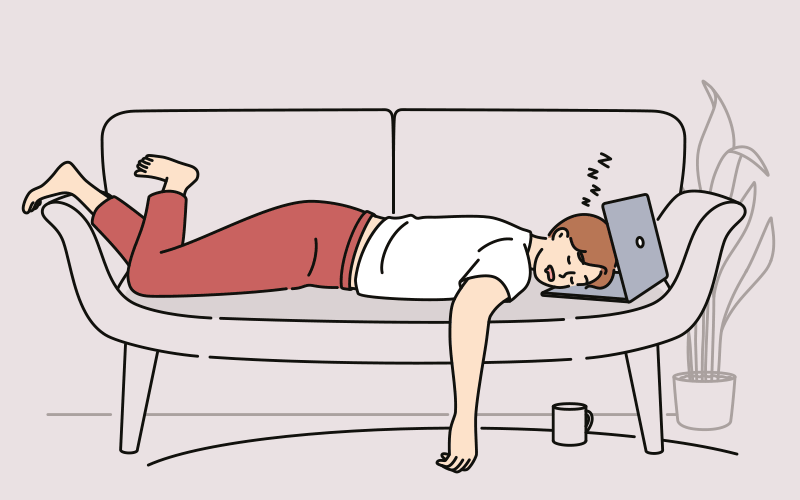Now is the workplace of our discontent

A new report reveals the state of mind of workers...
While ‘quiet quitting’, ‘quiet hiring’ and ‘quiet firing’ have all become part of the day-to-day office jargon in the UK over the last year or so, a new ‘quiet’ practice is making its presence known in the workplace to corporate alarm: ‘Quiet vacationing’ is the new kid on the block, referring to workers who take time off without telling their boss.
This latest evolution in workplace moodiness is yet another facet of employee disengagement at their jobs and that, with some notable national exceptions, there is both ambivalence and dark cloudiness hovering in the office and remote workplace air.
In June, US bank Wells Fargo fired a number of employees following claims that staff were faking keyboard activity to give the impression of working when they were not. Business news service Bloomberg first reported the move, based on a filing Wells Fargo made to the US’s Financial Industry Regulatory Authority, saying that more than a dozen people had been affected.
Technology such as ‘mouse jigglers’, which simulate keyboard activity, are widely used by workers to avoid their absence being picked up by sophisticated tools that can track keystrokes and eye movements and log which websites are being visited.
At the same time, a new global workplace report from analytics and advisory firm Gallup warns that the UK has a high percentage of workers who could be vulnerable to quiet vacationing. ‘The State of the Global Workplace: 2024 Report’ states that only 10% of the UK workforce is engaged and ranks at number 33, with number 1 having the greatest engagement, amongst 38 European countries. At only 7%, France has the lowest percentage of engaged workers within the 38. Romania’s 36% engaged workforce holds the top slot for engagement.
Under ‘life evaluation’, the UK fares better, with a rank of 15 amongst the 38 countries. According to the results, 48% of UK workers believe they are thriving and will still be doing so in five years. At number 1 is Finland, with 83% believing that they are and will be thriving. The Nordic countries and the Netherlands take the most optimistic views, with Denmark at number 2, Iceland at 3, the Netherlands at 4, Sweden at 5 and Norway at 6. But Northern Cyprus, also known as the Territory of the Republic of Cyprus, is the most pessimistic workforce of the 38 with only 18% believing that they are and will be thriving.
It is not surprising then that Northern Cyprus’s workforce has the largest percentage of workers feeling stress much of the day, with 65% saying that they did. Again, the UK placed at 15 within the 38, reporting that 40% of its workforce felt stress a lot during the day. The Baltics and Denmark were the least stressed, ranking 35 through 38 on the scale, with Denmark scoring the least and Estonia, Latvia and Lithuania at 35, 36 and 37 respectively.
Sadly, Northern Cyprus’s workforce was also the angriest, with 51% reporting that they felt anger much of the day. Unfortunately, the UK moved up the rankings to number 10 for feeling angry during the day, with 20% feeling angry during a lot of the day. Also reporting 20% of the workforce getting angry a lot of the day were the Czech Republic (8), Albania (9), and the Republic of Ireland (11). The bottom five, the workforces experiencing the least anger, were Portugal at 34, Estonia at 35, Iceland at 36, Netherlands at 37 and Finland at 38.
The UK was the second saddest location for workers, ranking lower than only Northern Cyprus in the countries reporting their experience of daily sadness. Only 5% of Kosovo’s workers reported experiencing a lot of sadness daily, making them the least sad workforce within the 38 European countries. Ranking in the lowest five countries, meaning that their workers reported the least amount of much daily sadness, were Serbia at 34, Croatia (35), Finland (36) and Lithuania (37).
Asked to think about the job market where they lived, respondents were questioned whether they thought the current time was a good or bad time to find a job. Of the UK workers, 48% said they thought the job climate was good, placing the UK at number 29. Surrounding the UK at numbers 28 and 30 were Bosnia and Herzegovina (28), where 49% thought it was a good time, and Switzerland (30) where 48% also believe the time was good. Eighty per cent of Denmark’s workers opted for ‘good’, where in Spain at number 38, only 32% believed so. Italy, also with 32% believing it was a good time to look for a job, was at 37.
Possibly the question with most interest to employers was around intent to leave: “To what extent are you currently looking for a different job than the one you have now? Are you actively looking for another job, watching for opportunities but not actively looking, or are you not looking for another job?” Albania ranked the highest, with 42% of respondents on the lookout for a new job, with neighbouring Bulgaria the lowest at 20%. The UK ranked near the middle, at number 24, with 31% intending to leave. The UK was flanked at number 23 by Estonia (also 31%) and Serbia at 25, with 30%. Ireland ranked 17th, with 33% looking for new opportunities.
With the global pandemic in our recent past, dissatisfaction with the ruling political classes evident in the world’s elections and catastrophic humanitarian crises still exploding around the world, it’s no surprise that disenfranchisement and discontent are so omnipresent today in the workplace population. But resolving those conditions will likely require significant catalysts outside the workplace to dissipate and disperse the malaise.
Image credit | Shutterstock
